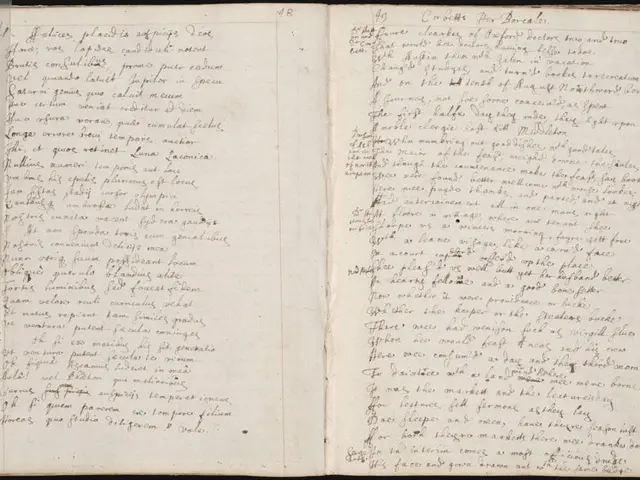BP stocks surge following oil giant's dividend increase and commencement of a share repurchase program
In a move to address pressure from activist investor Elliott Management, oil and gas giant BP has launched a significant cost-cutting programme, announced a $750 million share buyback, and raised its dividend per share by 4% to 8.32 cents.
Despite a decline in profit for various divisions, BP's financial performance has been met with approval from shareholders, with net debt falling and cost savings rising. Derren Nathan, head of equity research at Hargreaves Lansdown, commented that BP's financial discipline is welcome news for shareholders.
CEO Murray Auchincloss and incoming chair Albert Manifold have outlined key cost savings targets, aiming to achieve $4-5 billion in annual cost reductions by 2027. This ambitious plan includes eliminating about 15% of corporate jobs (around 6,200 positions) and thousands of contractor roles by the end of 2025. The goal is to reduce costs by approximately $2 billion within the year.
BP has already realized $1.7 billion in structural cost reductions since 2023, with $900 million saved in the first half of 2025 alone. These savings come from efficiency improvements such as AI and ERP implementation and significant workforce reductions.
The company has also sold about $3 billion in assets, including renewable energy and retail operations, to fund shareholder returns and focus on hydrocarbons. However, this pivot raises concerns among ESG investors and about long-term energy transition commitments.
BP continues to invest in low-carbon energy projects, as exemplified by the new JERA Nex bp offshore wind joint venture with a net potential generating capacity of 13 GW. However, its capital expenditure now prioritizes more oil and gas projects, with reduced spending on renewables, which account for less than 5% of its capital expenditures moving forward.
BP's 2025-2027 roadmap includes a $14-18 billion net debt reduction target and aims for a 16%+ return on capital employed (ROCE), signalling a focus on capital discipline and shareholder returns alongside the energy transition.
In the first half of 2025, BP started five major projects and made 10 exploration discoveries. The company's total revenue for the period was $95.6 billion, a 2.7% decrease from the same period the previous year. BP's profit before tax for the first half of 2025 was $6 billion, down from $5.9 billion in the same period the previous year.
The fluctuating oil prices due to an uncertain geopolitical environment and the escalating conflict in the Middle East in June 2025 caused Brent crude oil prices to spike more than nine percent, marking its most significant increase in over three years. Despite this, BP's second quarter profit for 2025 was $2.4 billion, a 14% decrease but exceeding a company-compiled analyst consensus of $1.8 billion.
BP's shares rallied nearly two percent as markets opened to 413.84 on Tuesday. The firm previously reduced costs by $750 million in 2024 and has already announced near 4,700 job cuts this year and a reduction of 3,000 contractors.
In response to the cost-cutting measures, BP's incoming chair, Albert Manifold, will assist Auchincloss in a review of the business to maximize shareholder value. Auchincloss stated that BP remains focused on its performance improvement strategy to grow cash flow and returns.
Total taxation for BP in the first half of 2025 was $3.1 billion, only slightly down from $3.4 billion despite a smaller profit. Higher tax rates in the first quarter of 2025 caused BP's average tax rates to rise to 50% from 36%.
BP is also bringing in tech juggernaut Nvidia to help reduce cycle time and get ahead of competition. The company's chief, Murray Auchincloss, has been tasked to add an extra $5 billion to the cost savings target announced in February.
In a notable development, BP made its largest oil discovery in 25 years off Brazil's Atlantic coast on Monday. Meanwhile, global economic factors, such as the fall in Brent crude oil prices to a four-year low of $59.23 due to sweeping tariffs imposed by President Donald Trump, continue to impact the industry.
In summary, under CEO Auchincloss and chair-elect Manifold, BP is pursuing a considerable cost-cutting program with significant workforce reductions, asset divestitures, and a disciplined capital allocation framework to increase shareholder value and respond to activist pressure from Elliott Management, while cautiously balancing investment in renewable energy.
Read also:
- Court petitions to reverse established decision on same-sex marriage legalization
- Trump's enforcement actions in Washington D.C.: Insights from the political arena
- Aircraft collides with another one on the runway during landing at Montana airport, igniting flames
- NFL apparently faces a lawsuit from former Raiders coach Jon Gruden, as Nevada court reportedly removed obstacles in his legal pursuit against the league following the release of controversial emails.







